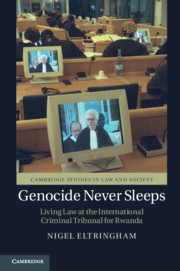Book contents
- Genocide Never Sleeps
- Cambridge Studies in Law and Society
- Genocide Never Sleeps
- Copyright page
- Contents
- Figures
- Acknowledgements
- Introduction: Judging the Crime of Crimes
- 1 ‘When We Walk Out; What Was It All About?’
- 2 ‘Watching the Fish in the Goldfish Bowl’
- 3 ‘Who the Hell Cares How Things Are Done in the Old Country’
- 4 ‘They Don’t Say What They Mean or Mean What They Say’
- 5 ‘We Are not a Truth Commission’
- Conclusion
- Bibliography
- Index
- Cambridge Studies in Law and Society
4 - ‘They Don’t Say What They Mean or Mean What They Say’
Published online by Cambridge University Press: 03 September 2019
- Genocide Never Sleeps
- Cambridge Studies in Law and Society
- Genocide Never Sleeps
- Copyright page
- Contents
- Figures
- Acknowledgements
- Introduction: Judging the Crime of Crimes
- 1 ‘When We Walk Out; What Was It All About?’
- 2 ‘Watching the Fish in the Goldfish Bowl’
- 3 ‘Who the Hell Cares How Things Are Done in the Old Country’
- 4 ‘They Don’t Say What They Mean or Mean What They Say’
- 5 ‘We Are not a Truth Commission’
- Conclusion
- Bibliography
- Index
- Cambridge Studies in Law and Society
Summary
Courtroom III, 9am. A protected, Rwandan prosecution witness is being cross-examined and is speaking in Kinyarwanda. The anglophone defence lawyer returns to parts of the witness’s testimony discussed the previous day. The witness complains ‘We shouldn’t be going back to issues that have already been dealt with.’ The judge gently explains to her that ‘lawyers’ questions assist the Court in evaluating the quality and accuracy of your testimony and it is sometimes necessary to revisit issues’. Asked where in a photograph of the crime scene she was standing in 1994, the witness tells the lawyer to consult her statement ‘I think everything is written therein.’
- Type
- Chapter
- Information
- Genocide Never SleepsLiving Law at the International Criminal Tribunal for Rwanda, pp. 118 - 151Publisher: Cambridge University PressPrint publication year: 2019

